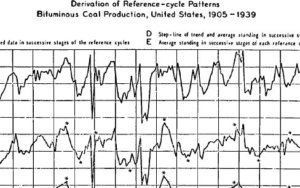I thought that such prediction would come true, sooner or later, because of the irresistible development of empirical economics in the past 50 years, one illustrated by the list of John Bates Clark medalists. Such expansion, fostered by the increasing availability of data and computing resources, could itself be recast as part of an even larger move toward making economics an applied science.
Then I heard about the prize being awarded for some ” work in empirical economics” and thought: it’s still about time. Then I saw that the prize had been awarded “for (the) empirical analysis of asset prices,” and finally,I realized that it went to Fama, Hansen and Shiller. Surprise!
It is not the identity of the winners that is surprising. Whether one believes that the Nobel should be awarded for work opening new research programs or for some lifelong devotion to scientific method, this year’s roaster is receiving wide approval: see for instance Krugman’s and Harford’s comments on how the efficient market hypothesis had provided a useful benchmark for further research, or Tabarrok’s and especially Cowen’s tributes to the breadth and scope of the three nobelists’ work. As usual, these accounts would have benefited from references to historical narratives, especially since the best histories of modern finance are as breathtaking as Game of Throne’s Red Wedding. These includes Jovanovic’s paper on the development of financial economics at MIT (Cootner, Samuelson) and Chicago (Fama), Perry Mehrling’s account of Fisher Black’s intellectual development (see chapter 3 on Fama and the CAPM), chapter 7 of Bernstein’s Capital Ideas, Fox’s The Myth of the Rational Market. Also, this idea that theories of finance are crucial not only for their impact on academic research but also because they were built into actual markets, had been masterfully developed by MacKenzie, Muniesa et alii (see this book). Such phenomenon – that economics produces the facts it studies – is called performativity.
No, what is a puzzle for me is the revamping of Fama and Shiller’s legacy as “empirical economics.” Of course, this is no denial of the extraordinary amount of empirical work they performed. Striking yet is the complete lack of reference to their theoretical insights in the “popular” material provided on the Nobel website. Of course, there’s the weird attempt to reconcile Fama’s findings – short term unpredictability of asset prices – and Shiller’s conclusions – 3 to 5 years predictability – or their posterity – analysis of rational responses to risk vs behavioral finance –. But while emphasizing the careful empirical analysis conducted by the laureates make sense, the “popular information” appears as an attempt to rewrite intellectual history with the aim of (over)emphasizing that economics science should be understood as an inductive process. The “discovery” narrative begins with empirical work, whose result may come as a surprise to the value-free investigator:
In a seminal study, Fama, Fisher, Jensen and Roll (1969) investigated stock price movements after news about stock splits. To their surprise, they found that the market seemed to incorporate information very swiftly (Popular release, p2)
Theorizing is seemingly not part of the laureates’ activity. At best, they make “conjectures” or “interpretations” of their empirical findings. Only in the conclusion is “a fruitful interplay between empirical work and theory development” quickly acknowledged. On the contrary, the “scientific background” begins with theories of asset pricing, then turns to Fama’s joint hypothesis problem (when a model is disconfirmed by expected returns data, it is not clear whether it’s because the market is not efficient or because the asset pricing model is flawed), and concludes with Hansen’s use of GMM to test Consumption Capital Asset Pricing models. In both “popular” and “scientific” accounts, however, the committee carefully avoids to mention that Fama’s name is foremost associated with “the efficient-markets hypothesis.” One single mention of “informational efficiency” is to be found in the “scientific” account, in passing. Econ bloggers keep noting how shrewd/ ironical/toxic this joint award is, a reminiscence of the Hayek-Myrdal 1974 prize. But contrary to what they acknowledge, for the lay audience, the 2013 prize does not reward the study of financial market efficiency.






